
Matthew Lee Anderson
Matthew Lee Anderson is an Assistant Professor of Ethics and Theology at Baylor University’s Honors College and the Associate Director of Baylor in Washington. He is an Associate Fellow at the McDonald Centre for Theology, Ethics, and Public Life at Oxford University, where he completed a D.Phil. in Christian Ethics. Anderson is a Perpetual Member of Biola University’s Torrey Honors College, and founded Mere Orthodoxy, a web-based magazine that since 2005 has been providing both long- and short-form commentary on matters of religion, politics, and culture from a broadly conservative, evangelical standpoint. He is the author of Earthen Vessels: Why Our Bodies Matter to Our Faith, and Called into Questions: Cultivating the Love of Learning Within the Life of Faith. Anderson writes occasionally for Christianity Today, The Gospel Coalition, The Washington Post, and other outlets. He lives in Waco, with his wife of fourteen years, where he regularly defeats fourth graders in basketball.

Matthew Arbo
Dr. Matthew Arbo is Associate Professor of Theological Studies and Director of the Center for Faith and Public Life at Oklahoma Baptist University. He earned his Ph.D in Theological Ethics at the University of Edinburgh. His research focuses on early modern moral and political theology, with special interest in questions related to law and economy. Arbo is currently exploring two projects: an introductory text on the virtues and, further out, a study of the concept of deceit in the Christian theological tradition. Arbo is the author of Political Vanity: Adam Ferguson on the Moral Tensions of Early Capitalism (Fortress Press, 2014) and, more recently, Walking Through Infertility (Crossway, 2017), a resource for churches on the challenges of infertility.

Cliff Arnold
Cliff Arnold is the Chief Resident in Psychiatry at the University of Kansas–Wichita. He also serves as the Vice-Chair of his hospital system’s Ethics Committee, a role for which the Ramsey Fellowship provided a stellar formation. He received an MA in the History and Philosophy of Science at Notre Dame and an MD from Indiana University. When he isn’t thinking about psychiatry and ethics, Cliff is caught up in wonder at his two miraculous boys and their inimitable mommy. He is extremely proud to be a PRI alum.
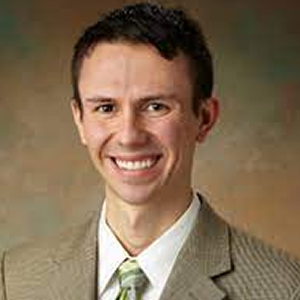
Ian Clausen
Ian Clausen, currently a Lilly Postdoctoral Fellow at Valparaiso University, earned his Ph.D. in Theology and Ethics from the University of Edinburgh. He is a former British Marshall Scholar (2008-2011), and holds the temporary post as Research Associate for the Kirby Laing Institute for Christian Ethics, based in Cambridge England. Clausen divides his research between Augustinian studies, bioethics, and contemporary moral theology, and has written for a number of academic journals including Augustinian Studies, Radical Orthodoxy, and The Expository Times.
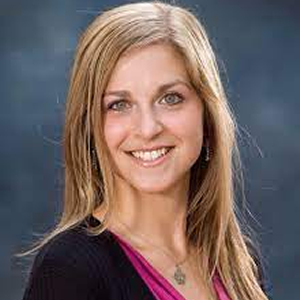
Sally Forsythe Crippen
Sally Forsythe Crippen resides in the greater St. Louis area with her husband Zac and daughter Esther. Sally earned her BA in Philosophy and Music at Valparaiso University and her MA in Bioethics and Medical Law at St. Mary’s University (UK).
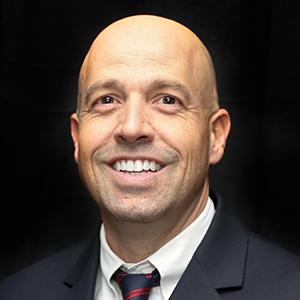
Todd Daly
Todd Daly is currently Associate Professor of Theology and Ethics at Urbana Theological Seminary in Champaign, Illinois. His writings have appeared in publications including Ethics & Medicine, The Journal of Evolution and Technology, Christianity Today, and several edited volumes dealing with transhumanist philosophy from a theological perspective, including Transhumanism and Transcendence (Georgetown University Press), and Religion and Transhumanism (Praeger). Dr. Daly also serves on the ethics committee of Carle Foundation Hospital in Champaign-Urbana. He is currently writing a book in theological ethics dealing with radical life extension entitled Chasing Methuselah. Dr. Daly holds a bachelors degree in electrical engineering from Iowa State University, an M.Div. from Trinity Evangelical Divinity School, and a Ph.D. in theology from the University of Edinburgh. You can find his book Chasing Methuselah: Theology, the Body, and Slowing Human Aging on Amazon.
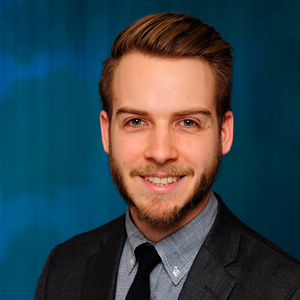
John Brewer Eberly, Jr.

Ashton Ellis
Ashton Ellis, JD, PhD, works as a consultant to the Patients Rights Action Fund (PRAF) and the Institute for Patients Rights (IPR). He develops curriculum for continuing education units (CEUs) to train physicians, attorneys, and allied professionals on the eligibility criteria for California’s End of Life Option Act; the state’s assisted suicide law. The classes, approved by the University of Nevada School of Medicine and the California State Bar, explain how to identify warning signs for mental health problems and potential coercive social factors. A 2015 Novak Fellow, Ashton’s commentary has appeared at Public Discourse, The Federalist, and The Daily Caller. His dissertation (2016) is titled, Measuring the Disability Rights Framing Effects on Public Opinion about Assisted Suicide: Elite Interviews and an Experimental Survey.

Matthew Eppinette
Matthew Eppinette, MBA, PhD, is Executive Director of The Center for Bioethics & Human Dignity (CBHD). Dr. Eppinette has two decades of experience in the field of bioethics, including serving CBHD previously, from 2002-2007. He holds a PhD in Theology with concentrations in Christian Ethics and Theology & Culture from the Center for Advanced Theological Studies at Fuller Theological Seminary in Pasadena, California, where he also earned an MA in Theology. He is a graduate of the MA Bioethics program at Trinity International University, and he has an MBA with concentrations in Quantitative Analysis and Information Systems from Louisiana Tech University. Dr. Eppinette’s current research interests include transhumanism, Alasdair MacIntyre’s ethics and epistemology, and the intersection of fiction, film, and other areas of culture, particularly popular culture, that raise or address bioethics issues.
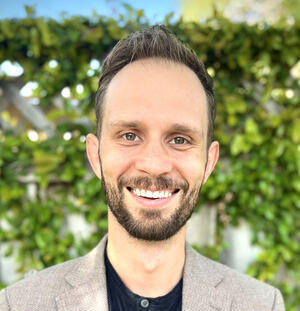
Rich Eva
Rich Eva is a philosophy Ph.D. candidate at Baylor University specializing in ethics and social & political philosophy. He earned his B.A. in philosophy at Princeton University. His published work has involved medical ethics, philosophy of law, environmental ethics, business ethics, pedagogy, Kierkegaard, Aquinas, Marx, and Plato. And his current research focuses on politicization, polarization, private property rights, virtue ethics, philosophy of sport, tech ethics, and classroom techniques aimed at improving civil discourse. Rich has served as the president of Baylor’s philosophy graduate student body and as a bioethics bowl coach. To learn more about Rich, you can visit his website at richevaphilosophy.com.

Debra Erickson
Debra Erickson is an author, ethics consultant, and elected official in central Pennsylvania, where she currently resides. She earned a Ph.D. in ethics from the University of Chicago and a Master’s degree in theology from Regent College (Canada). Erickson is co-editor of Jean Bethke Elshtain: Politics, Ethics, and Society (Notre Dame, 2018), and has published chapters or articles on just war, casuistry, environmental ethics, and university ethics. In addition to academic journals, her writing has appeared online in Sightings, Providence, and the Chronicle of Higher Education. She is currently working on a book about how Christians should think about politics. A native of Oregon, she confronted issues of bioethics and public policy as a citizen and political aide well before becoming a scholar.
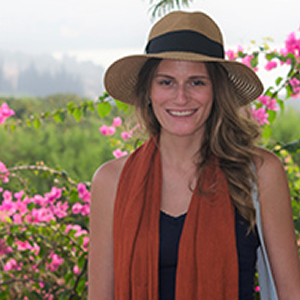
Kallie Fell
Kallie Fell is a registered nurse in the Birth Center at the University of California, San Francisco. Kallie has been a labor and delivery nurse for almost three years and also holds an undergraduate degree in Animal Sciences and a graduate degree in Reproductive Physiology from Purdue University. Her graduate work focused on epigentics and the role of maternal exercise on their offspring. Kallie started her professional career as a scientist in the Department of Obstetrics and Gynecology at Vanderbilt University where she assisted in the investigation of endometriosis and pre-term birth with the Women’s Reproductive Health Research Center. Kallie found that she enjoyed interacting with women in a clinical role and went back to school to become a registered nurse. Kallie will tell you that she is passionate about two things: her family and women’s health. Kallie now serves as the Executive Director for the CBC.

Ben Frush
Ben Frush is a resident training in Internal Medicine and Pediatrics at Vanderbilt. He holds his B.A. in psychology from Duke University, Master’s of Christian Studies from Duke Divinity School where he was a Theology, Medicine, and Culture Fellow, and his MD from UNC School of Medicine. He is interested in how theology and moral philosophy can inform current conversations involving disability, conscience, end-of-life care, and the moral formation of medical students and residents in pre-clinical and clinical education.

Morgan Fuller
Morgan Fuller is a dual degree student earning her JD and MA in Catholic Studies at University of St. Thomas. She is a Murphy Scholar for the Terrence J. Murphy Institute for Catholic Thought, Law, and Public Policy and helps run her school’s St. Thomas More Society and Health Law Society. Her interest in bioethics involves biomedical ethics and end of life issues. She hopes to pursue her Ph. D. in Catholic bioethics and is proud to be a fellow for the Paul Ramsey Institute.
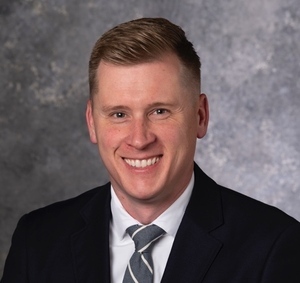
Dallas Gingles
Dallas Gingles is the Associate Director of the Houston-Galveston Extension Program of Perkins School of Theology, Southern Methodist University, where he teaches courses in moral theology, systematic theology, Dietrich Bonhoeffer, and bioethics. His research focuses on grave moral ambiguity. His current work includes a monograph entitled The Morality of Sovereignty: Everyday Ethics and the Exceptional, that argues that the modern concept of political sovereignty is intrinsically morally aspirational, and a co-edited volume on the future of Christian realism. He has published in the Journal of the Society of Christian Ethics, the Political Theology Network, and is a frequent contributor to The Dallas Morning News.
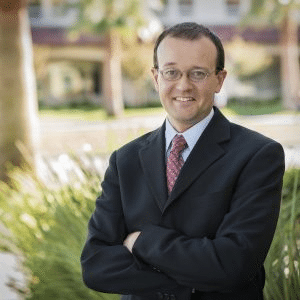
Brian Green
Brian Patric Green is the director of technology ethics at the Markkula Center for Applied Ethics at Santa Clara University and teaches AI ethics in Santa Clara University’s Graduate School of Engineering. His work focuses on AI and ethics, the ethics of technological manipulation of humans, the ethics of mitigation of and adaptation towards risky emerging technologies, and various aspects of the impact of technology and engineering on human life and society, including the relationship of technology and religion.
Green is author of the book Space Ethics(2021), co-author of Ethics in the Age of Disruptive Technologies: An Operational Roadmap (The ITEC Handbook)(2023), co-editor of the book Religious Transhumanism and Its Critics(2022), and co-editor of a special issue of the Journal of Moral Theology on AI(2022), among others.
Green has been a lead contributor on three World Economic Forum case studies on ethical practices at Microsoft, Salesforce, and IBM, and has worked with the Partnership on AI, the Vatican’s Dicastery for Culture and Education, and technology companies ranging from startups to the largest.
Green has doctoral and master’s degrees in ethics and social theory from the Graduate Theological Union in Berkeley, and his undergraduate degree is in genetics from the University of California, Davis.

Aurora Griffin
Aurora Griffin is currently an MBA candidate at The Stanford Graduate School of Business and is on faculty at the Busch School of Business at The Catholic University of America. Prior to this, she earned her Masters in Theology at Oxford University as a Rhodes Scholar. Her undergraduate training is a BA in The Classics, which she earned at Harvard University in 2014. She also wrote a book, How I Stayed Catholic at Harvard (Ignatius Press 2016). Her primary research interests involve ethics with reference to the Western intellectual tradition. She was in the inaugural cohort of Fellows at the Paul Ramsey Institute.

Dylan Griswold
Dylan Griswold is a first-year medical student at Stanford Medical School. He earned his undergraduate degree from Williams College where he studied Chemistry and Comparative Literature. His research interest focuses on improving neurosurgical care in low-resource settings and the ethical issues that arise from humanitarian healthcare. Furthermore, he is interested in how John Paul II’s Theology of the Body has implications for physicians and the way in which they approach complex bioethical decision making.

Julie Dotterweich Gunby
Julie Dotterweich Gunby is pursuing a Ph.D. in Philosophy & Bioethics at Saint Louis University. Her research interest is in philosophical theology and nursing ethics, particularly the ways that virtue ethics and epistemology can be employed to improve perinatal morbidity & mortality. She has practiced for 10 years as a Certified Nurse Midwife and serves on the ethics committee at Northside Hospital Gwinnett in Atlanta where she delivers babies for underinsured women and teaches obstetrics to medical residents. Prior to becoming a nurse-midwife, Julie received a Master of Theological Studies from Duke Divinity and a Bachelor of Arts in Philosophy from the University of Georgia.

David Guzzardi
David Guzzardi is an MD-PhD student at the University of Calgary. His research seeks to ameliorate the surgical management of cardiovascular disease using advanced imaging techniques. David is also interested in how medical technologies interface with palliative care for patients with non-cancer disease and the ethical considerations that accompany these discussions.
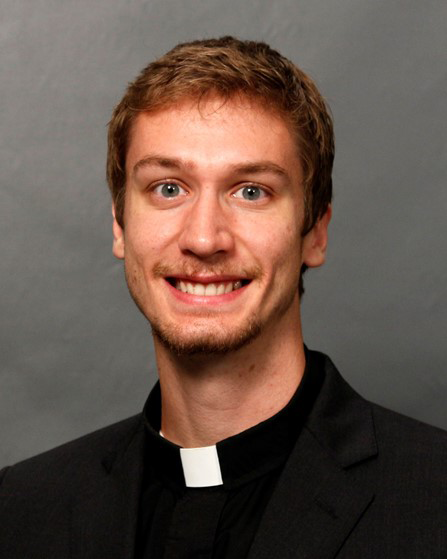
Silas Hasselbrook
Silas Hasselbrook is a doctoral student at Marquette University in Systematic Theology and Theological Ethics, with an interdisciplinary focus on Health Care Ethics. He is an ordained Lutheran minister, with an MDiv from Concordia Theological Seminary, currently serving two churches in the Milwaukee area. His current areas of research are in theological anthropology, bioethical personhood, and fourth and fifth century Patristics.
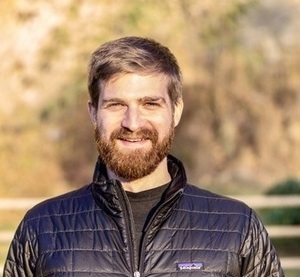
Justin Hawkins
Justin R. Hawkins is a Doctor of Philosophy Candidate at Yale University pursuing a combined PhD between the departments of Religious Studies and Political Science. His research interests focus on Christian social ethics and political theology. His dissertation, entitled “Crowned with Glory and Honor: The Virtue of Magnanimity, and its Discontents” examines the reception of the classical virtue of magnanimity in the Stoics and the Greeks, its reception among the Christians through Scholasticism and Augustinianism, its rejection by the architects of early modern capitalism, and the possibility of a constructive retrieval of the democratic virtue of magnanimity.

Thomas Holcombe
Thomas Holcombe is an active-duty physician in the United States Navy. He is currently assigned as a flight surgeon with Helicopter Sea Combat Squadron TWO-EIGHT (HSC 28). He is currently enrolled at Trinity International University Masters of Arts in Bioethics program. This past year, he was commissioned as a fellow in the Colson Fellowship. He graduated from Covenant College in 2012 with a Bachelor’s degree in chemistry and received his medical degree from the University of South Alabama College of Medicine in 2016. His interests lie with the theology of the body, personhood, and human sexuality.

Alice Ing
Alice Ing is a psychiatry resident physician and serves on the Ethics Committee at University of California Irvine Health. She graduated from Yale University in 2011 with a B.A. in Religious Studies with a Concentration in Bioethics. Her senior thesis was titled “Evangelical Christian Perspectives on Assisted Reproductive Technologies.” After graduating, she returned to sunny California to receive her M.D. and M.A. in Bioethics at Loma Linda University, a Seventh Day Adventist institution whose motto is “to make man whole.” Her masters thesis was titled “Neuroscience and Free Will: Implications for the Christian Faith.” After she received her M.A. and before starting medical school, she worked at the Center for Christian Bioethics and helped teach bioethics to medical students. During medical school, she served on the Clinical Ethics Committee at Loma Linda University Health. She also devoted much of her time to promoting wellness and resilience among her peers. Her academic interests include consult & liaison psychiatry, palliative care, clinical ethics, and the integration of spirituality & mental health.

Paul Kalanithi (1977—2015)
Paul Kalanithi, M.D., was a neurosurgeon and writer. Paul grew up in Kingman, Arizona, before attending Stanford University, from which he graduated in 2000 with a B.A. and M.A. in English Literature and a B.A. in Human Biology. He earned an M.Phil. in History and Philosophy of Science and Medicine from the University of Cambridge before attending medical school. In 2007, Paul graduated cum laude from the Yale School of Medicine, winning the Lewis H. Nahum Prize for outstanding research and membership in the Alpha Omega Alpha medical honor society. He returned to Stanford for residency training in Neurological Surgery and a postdoctoral fellowship in neuroscience, during which he authored over twenty scientific publications and received the American Academy of Neurological Surgery’s highest award for research. Paul’s reflections on doctoring and illness—he was diagnosed with lung cancer in 2013— have been published in The New York Times and The Paris Review Daily, in addition to interviews in academic settings and media outlets such as NBC Bay Area. Paul completed neurosurgery residency in 2014 and lived in San Carlos, CA. He is survived by his wife Lucy and their daughter Cady.
Visit Paul’s website for more information on his life and to read selections of his writings.
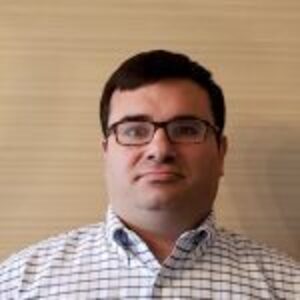
Aaron Klink
Aaron Klink is chaplain at Pruitt Hospice in Durham, North Carolina. He received his Bachelor’s degree in Theology in Political Science from Emory University, his Master of Science in Systematic Theology from the Lutheran Theological Seminary at Philadelphia, and his Master of Divinity from Yale Divinity School where he interned with the Yale Bioethics Center. He also received a Master of Theology in Ethics at Duke Divinity School where he was the Westbrook Fellow in the Program in Theology and Medicine. His Duke thesis, written while working with veterans suffering from PTSD and Moral Injury, explored the theological implications of anti-depressant medications. He is interested in end-of-life ethics, palliative care, theological interpretations of suffering, psychiatric disability studies, the role of chaplains in medical systems, and how communities care for the sick. His publications appear in many journals including the American Journal of Bioethics.

Katarina Lee
Katarina Lee is a Canadian who graduated from the University of Dallas in 2012. Her senior thesis in Philosophy was entitled “The Ethical Life: The Ethical Implications of Genetic Engineering for Human Enhancement.” She completed her MA in Bioethics in 2013 focusing in reproductive ethics. Her MA thesis was entitled “The Exploitative Nature of Ova ‘Donation.’” Upon graduation from NYU, Katarina began law school and is currently in her second year at the University of Minnesota concentrating in Health Law & Bioethics. In the summer of 2015 she worked as a Blackstone Legal Fellow working at the Comment On Reproductive Ethics in London.

Marc LiVecche
Marc LiVecche is managing editor of Providence: A Journal of Theology and American Foreign Policy and Scholar of Christian Ethics, War, & Peace at The Institute on Religion and Democracy in Washington, DC. He earned his PhD at the University of Chicago in Religious Ethics where, until her death, his work was supervised by Jean Bethke Elshtain. His dissertation research focused on the articulation of an ethical framework from within the just war tradition that helps combat veterans rupture the link between lawful killing and moral injury. He has enjoyed the Ramsey Fellowship and his collaboration with the Center for Bioethics and Culture for many reasons—chief among them is the exposure to good people doing good work with courage, conviction, and a capacity to bridge what is too often a gap between truth and everyday life, especially in the realm of medical and reproductive ethics. The Ramsey Fellowship meetings have been essential in helping him to think through what it means to be a human being, in particular through giving him a deeper understanding of the relationship between human nature and moral life, and how our basic ethical assumptions lead to actions that either enhance or diminish human flourishing.
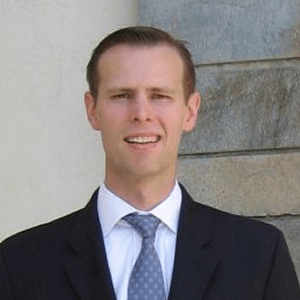
David Major
David Major is a community member of the University of California Irvine Health Ethics Committee. He earned his Juris Doctor degree at the University of California, Los Angeles (UCLA) School of Law. Subsequently, he completed a Master of Science degree in Bioethics. As an attorney, David practiced biodiversity, disability, and administrative law. As a policy specialist, he advocated for improved reporting on end-of-life interventions in California and developed international agreements to protect environmental health. His research interests include neuroethics, beginning and end-of-life issues, biotechnological enhancement, environmental ethics, conscientious refusal in medicine, and the meaning of suffering and dignity.

Maggie McCann
Maggie McCann is an MD-PhD candidate at Creighton University where she studies Neuroimmunology. Her interests in bioethics focus on the relation between Aristotelian-Thomistic Philosophy and modern science, and the ethical use of new scientific technologies. Maggie holds a Masters in Laboratory Animal Science from Stanford University where she studied a translational model of spinal cord injury in a neuroscience lab. She holds a Bachelor of Arts from Thomas Aquinas College in Southern California where her senior thesis explored the philosophical definition of life.

Kevin McKay
Kevin McKay is a third-year medical student at the University of California, Los Angeles. He earned his B.S. in Biomathematics with a minor in Chemistry at Loyola Marymount University in 2014. He is interested in exploring how microvascular changes in the eye correlate with vision loss in chronic disease states and in the setting of long-term space flight. He enjoys teaching, surfing, cooking, and discussing bioethics with friends, and feels exceptionally blessed to be a part of the 2019-2021 cohort.
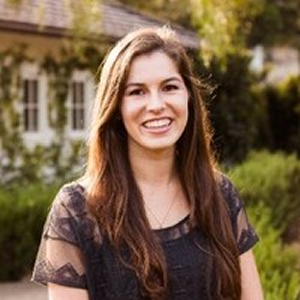
Elizabeth (Grossman) Moore
Elizabeth (Grossman) Moore is currently an Innovation Postdoctoral Fellow at the Novartis Institute for Biomedical Research (NIBR). She earned her Ph.D in chemistry and chemical biology from the University of California, Berkeley and her BS degree in chemistry from Westmont College. Working daily to develop cutting-edge technologies for use in drug development, she is passionate about grappling with the intersection of scientific innovation and the ethical burden of discovery. Her interests are wide-ranging, from target ID and platform technologies to transhumanism and the moral responsibilities of scientists, and she hopes to encourage other research scientists to grapple with the ethical implications of their work.
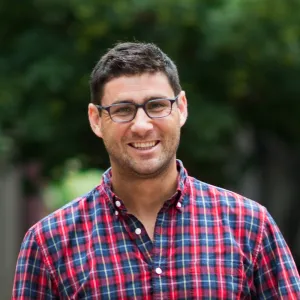
Travis Pickell
Travis Pickell is Assistant Professor of Theology & Ethics and Faculty Fellow in the Honors Program at George Fox University in Newberg, Oregon. He is also the director of the Character Virtue Initiative and oversees the Cornerstone Core curriculum. He is a scholar of religious ethics, with a particular focus on the intersection of religion, medicine, and society. Some of his other interests include the modern and postmodern conditions of religious belief and practice, issues of religious pluralism and public life, and the broad field of Christian theological ethics. His first book is a theological account of agency-in-dying. He received his Ph.D. from the University of Virginia, M.Div. from Princeton Theological Seminary, and B.A. from The College of William & Mary.

Bryan C. Pilkington
Bryan C. Pilkington is an associate professor in the Department of Interprofessional Health Sciences and Healthcare Administration and School of Health and Medical Sciences at Seton Hall University.
Dr. Pilkington’s research focuses on questions in moral and political philosophy, in particular on the concept of dignity, and in bioethics, where he is especially interested in questions of conscience, moral responsibility, and the practice of medicine. He lectures on practical ethical challenges in the practice of health care professionals and teaches courses in normative and applied ethics, including courses in ethical theory, medical ethics, business ethics, environmental ethics, and political philosophy.
Dr. Pilkington currently serves on the Editorial Advisory Board for the Journal of Medicine and Philosophy and the Editorial Board of HealthCare Ethics Committee Forum and Christian Bioethics. Prior to joining the Seton Hall community, Dr. Pilkington served as the Director of Academic Programs at Fordham University’s Center for Ethics Education, where he directed Fordham’s MA program in Ethics and Society and Fordham’s minor in Bioethics. Prior to that, Dr. Pilkington was Assistant Professor of Philosophy at Aquinas College, where he served as chair. Dr. Pilkington is the winner of two Lilly Foundation Faculty Research Partnership Awards, the 2016 Aquinas College Outstanding Teacher Award, a 2015 Aquinas College Outstanding Scholar Recognition Award Nominee, the University of Notre Dame Outstanding Graduate Student Teaching Award, and the John B. Noss Prize in Philosophy from Franklin and Marshall College. He is also a member of Phi Beta Kappa.

Matthew Puffer
Matthew Puffer is Associate Professor of Humanities and Ethics at Christ College, Valparaiso University. He has held appointments as a Visiting Scholar in the Faculty of Divinity, University of Cambridge, as the Reid Fellow at Westminster College, Cambridge, as the Patricia H. Imbesi St. Augustine Fellow in The Augustinian Institute and as a Catherine of Siena Fellow in the Ethics Program, both at Villanova University, and as a postdoctoral fellow at the Institute for Advanced Studies in Culture. He is co-editor of Comparative Religious Ethics: Critical Concepts in Religious Studies (New York: Routledge, 2014) and has published in the Harvard Theological Review, Journal of Religious Ethics, Journal of the Society of Christian Ethics, Modern Theology, International Journal of Systematic Theology, and in edited volumes. His research considers competing accounts of the human person, especially rival versions of the “imago dei” and “human dignity” and their implications for issues in practical and social ethics. He holds a BS in chemical engineering from North Carolina State University, an MDiv from Princeton Theological Seminary, and a PhD in Religious Studies from the University of Virginia.
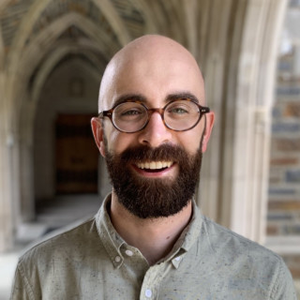
Wilson Ricketts
Wilson Ricketts is a medical student at The University of Alabama at Birmingham School of Medicine, class of 2020. He completed a bachelor’s degree in biology at Covenant College and is a fellow in the Theology, Medicine, and Culture Initiative at Duke Divinity School. His research interests include the ethics of access to healthcare domestically and globally, care at the end of life, and the theological/philosophical presumptions that cause providers and patients to view medicine as a means of control rather than an embodiment of presence and care. Wilson intends to apply to residency programs in either pediatrics or combined internal medicine-pediatrics and is considering a career in palliative care. He is honored to be a Paul Ramsey fellow.

Evan Rosa
Evan Rosa is a writer, editor, teacher, and learner. He currently serves as Communications Officer, at the Yale Center for Faith and Culture. His research interests include moral psychology, virtue ethics, technological ethics, social criticism, and the history of ideas. He holds bachelor degrees in philosophy and linguistics from the University of California, Berkeley, and a masters degree in philosophy from Biola University. He co-wrote the award-winning documentary Eggsploitation and directed communications for the Center for Bioethics and Culture from 2008 to 2013. He was a Ramsey Fellow from 2011 to 2013.
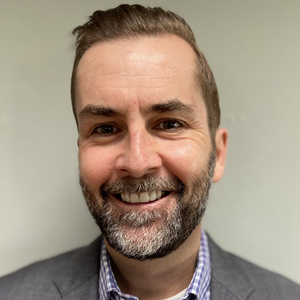
Matthew Rose
Matthew Rose is the Director and Senior Fellow at the Berkeley Institute. A scholar of religion, he was previously Ennis Fellow in Humanities at Villanova University, where he taught courses in philosophy, politics, and literature. He received his Ph.D. from the University of Chicago after attending the University of Notre Dame. His publications include Ethics with Barth (Ashgate, 2010).

Dr. Landon Roussel
Dr. Landon Roussel is currently a Senior Resident in Internal Medicine at the Mount Auburn Hospital and a Clinical Fellow in Medicine at Harvard Medical School. He earned his M.D. from Cornell Medical College, a master’s degree in bioethics through the Erasmus Mundus program in the Universities of Leuven (Belgium), Radboud (Netherlands) and Padua (Italy) and bachelors’ degrees in biochemistry and Hispanic studies from Rice University. He was a member of the inaugural medical cohort for Fellowships at Auschwitz for the Study of Professional Ethics through the Museum of Jewish Heritage in New York City. He is the founder of Communitas Primary Care, a direct primary care practice opening Winter 2016 in Baton Rouge. His research interests include distributism, the history of ethics and end of life issues. He is currently publishing a book on the Way of Saint James of Compostelle, which he has walked three times. He resides in Cambridge, Massachusetts.

Victor Saenz
Victor Saenz is Executive Director of the Houston Institute. He completed his PhD in philosophy at Rice University in August 2018, where he wrote a dissertation on the relation between Aristotle’s theory of desire and the list of the moral virtues in the Nicomachean Ethics. His research interests include ancient Greek philosophy as well as ethics and bioethics. While at Rice, he served as Senior Managing Editor of bothThe Journal of Medicine and Philosophy and Christian Bioethics. He holds a B.A. in philosophy and classics at the University of Notre Dame (2009) and an M.A. in philosophy from Texas A&M (2011).

Bailey Sanford
J. Bailey Sanford is a medical student at the University of North Carolina, Chapel Hill. He received an M.Div. from Duke Divinity School where he was a fellow in Duke’s Theology, Medicine, and Culture initiative. His interests in bioethics include drawing on religious ascetic traditions to promote disciplined health maintenance regimens. He has also been engaged in research examining patient perspectives on spiritual care in the world of medicine. As United Methodist clergy, Bailey is interested in facilitating conversations among laypersons around end-of-life issues. In the future, he hopes to work in ecclesial health initiatives in the United Methodist Church.

Grace Emily Stark
Grace Emily Stark is a central Texas-based writer, editor, and speaker. She is the Editor of Natural Womanhood, a nonprofit dedicated to the promotion of authentic women’s health, and co-host of The Natural Womanhood Podcast. In 2019, she was awarded a Robert Novak Alumni Fund Journalism Fellowship to write a series of longform articles on the history of birth control and the need for a more authentic vision of women’s health and reproductive care. Grace holds a M.A. in Bioethics & Health Policy from Loyola University Chicago, and her Master’s thesis on promoting breastfeeding-friendly policies and institutions as being grounded in the tenets of Catholic social teaching was published in The Linacre Quarterly. Grace holds a B.S. in Healthcare Management & Policy from Georgetown University, and during her time there, she worked in the Pellegrino Center for Clinical Bioethics and was a co-founding member of both the Undergraduate Bioethics Society and the Undergraduate Bioethics Bowl team. Grace is most interested in the practical applications of bioethics, and uses her knowledge in bioethics to inform her writing and her women’s health advocacy work.
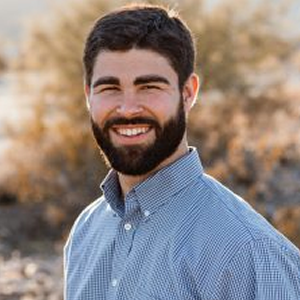
Dillon Stull
Dillon Stull is a medical student at Stanford Medical School (matriculating class of 2017) concentrating in Bioethics and Medical Humanities. He earned a liberal arts degree in the University Scholars program at his alma mater, Baylor University. He then completed a Master of Arts in Christian Studies at Duke Divinity School through the Fellowship in Theology, Medicine, and Culture. He maintains interests in poetry, philosophy, and theology and is currently working on a research project pertaining to the ethics of certain stem cell biotechnologies and the human identity.
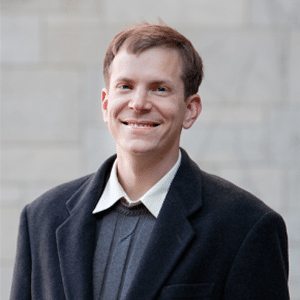
Daniel Strand
Daniel Strand is a faculty member in the Air War College. He serves as Assistant Professor of Ethics in Department of Leadership and Warfighting.
Prior to his appointment he was a Postdoctoral Fellow at Arizona State University (2015-19) in the History Department and the Program in Political History and Leadership. At the Air War College he teaches courses on the Just War tradition, moral theory, and applied ethics. Strand’s research interests include the political and moral theology of Augustine of Hippo and the Augustinian tradition, ethics and foreign policy, the Just War tradition, bioethics, and moral theory.
He is the author of the forthcoming Gods of the Nations (Cambridge University Press), a historical study of Augustine’s political theology in City of God. He has published articles and book chapters on Augustine of Hippo, Hannah Arendt, and the ethics of euthanasia. He is a a contributing editor at Providence: A Journal of Christianity and American Foreign Policy. He received his B.A. from University of Minnesota, M.Div. from Gordon-Conwell Theological Seminary, and Ph.D in Religion and Ethics from University of Chicago.
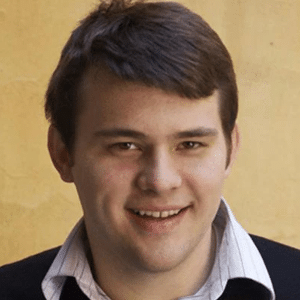
Christopher White
Christopher White is Program Director for the Paul Ramsey Institute. He holds an M.A. in Ethics and Society from Fordham University and a B.A. in Politics, Philosophy, and Economics from The King’s College. His writings have appeared in the Wall Street Journal, USA Today, Forbes, New York Daily News, International Business Times, The American Interest, National Review, First Things, Public Discourse, and Human Life Review, among many other print and online publications. He is co-author of Renewal (Encounter Books, 2013) and a 2013-2014 Robert Novak Fellowship Award Winner. He lives in New York City.

Samantha Stephenson
Samantha Stephenson is a Catholic author and bioethicist rooted in the belief that every human life is a gift worth nurturing.
Her work explores the intersection of faith, family, and emerging technologies, grounded in the rhythms of the garden and the teachings of the Catholic Church. Whether pondering the ethics of gene editing or harvesting tomatoes with her children, she invites others to grow where they’re planted—and to live deeply, attentively, and with reverence for the mystery of being human.
She is the author of Reclaiming Motherhood from a Culture Gone Mad the Mama Prays Devotional, and the forthcoming books The Bellbind Letters: Inside the Devil’s Plan for Your Motherhood and Grow Where You’re Planted: Reclaiming Eden in Your Own Backyard (coming in 2026).
Samantha holds master’s degrees in theology and bioethics, and is a former Paul Ramsey Fellow at the Center for Bioethics and Culture (2023-2025) and course instructor for Notre Dame’s McGrath Institute.
Samantha’s writing has been featured at Blessed Is She, CatholicMom, Crisis Magazine, The Federalist, FemCatholic, Natural Womanhood, Notre Dame’s Grotto Network, Our Sunday Visitor, Public Discourse, and Word on Fire.
Stay connected via her author newsletter.

Charity Ngaruiya
Charity Ngaruiya is originally from Kenya and holds a Ph.D. in Intercultural Studies from Biola University, a Master of Theology from Fuller Theological Seminary, and a Master of Divinity from International Leadership University in Kenya.
She is a board-certified chaplain currently serving at LA General Medical Center through the Presbyterian Consortium, under the Synod of Southern California. Previously, she served in the Providence Health System for nearly nine years. Charity is also actively involved in local ministry, serving as a pulpit supply pastor in Presbyterian churches across the Los Angeles area.
In 2024, she presented at the California Street Medicine Symposium, hosted by the Keck School of Medicine, on the topic Dying at the Margins: Spirituality and the Culture of Homelessness. After completing her fellowship with the Paul Ramsey Institute, she will begin a Master of Science in Bioethics at Harvard Medical School in the fall of 2025.

Jackson McNeece
Jackson McNeece is a PhD student in theology and ethics at Baylor University, with a particular focus on bioethics. He earned his master’s degree from Duke University in 2024 and returned to his alma mater, Baylor, to pursue further study in theological bioethics and disability ethics. Outside of academics, Jackson enjoys running, playing racquetball, eating ice cream, and cheering on the Baylor Bears.

Benjamin Parviz
Benjamin Parviz is a Ph.D. student at Saint Louis University studying Philosophy & Bioethics in the philosophy department and in the Albert Gnaegi Center for Health Care Ethics. His primary research topics are hope and despair. His work responds to the increase of despair across contemporary society, as evidenced by increases in harmful and self-destructive behaviors, including violence and suicide. He works to identify the social and cultural forces that provoke despair so that he can better understand hope and how to help people to hope well. His ideas about hope and despair are especially influenced by Augustine of Hippo and Gabriel Marcel. Ben holds a Bachelor of Arts in Theology from Concordia University Chicago, a Master’s Degree in Theological Studies from Saint Louis University and a Master’s in Philosophy from University of Missouri – St. Louis. He is an adjunct member of the philosophy faculty at Lewis and Clark Community College in Godfrey, Illinois.

Libby Regenerus
Libby Regnerus is currently a doctoral student in philosophy at Baylor University. She graduated from the University of Dallas, majoring in philosophy and minoring in politics. Her research focuses on questions within ethics and bioethics, particularly virtue theory, moral psychology, self-determination, and the significance of embodiedness. As a former athlete and natural living enthusiast, she was first drawn to bioethics through considering the connection between bodily health and living well and she’s excited to continue pursuing these topics.

Paul Rezkalla
Paul Rezkalla is an Assistant Professor of Philosophy at the United States Air Force Academy. He is also currently a Visiting Fellow in Ethics & Politics at the University Vita-Salute San Raffaele (Milan) and an Associate at the Ian Ramsey Centre for Science and Religion at the University of Oxford. Before joining USAFA, he was a Postdoctoral Researcher in Philosophy at Baylor University and the Arete Professorial Fellow at Hillsdale College. He holds a PhD in philosophy from Florida State University, a M.Sc. in cognitive and evolutionary anthropology from the University of Oxford, an M.A. in philosophy from the University of Birmingham (U.K.), and an M.A. in theology from Saint John’s University. His work has been published in academic venues such as the Journal of Medical Ethics, American Journal of Bioethics, Journal of Medicine & Philosophy, Oxford Studies, and Religious Studies.
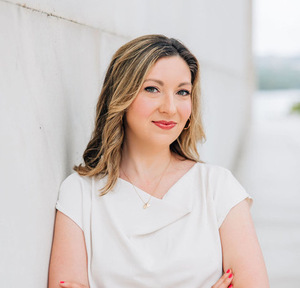
Katelyn Walls Shelton
Katelyn Walls Shelton is an adviser at the Institute for Women’s Health, working on international pro-life women’s health policy. Before joining IWH, she worked at the U.S. Department of Health and Human Services’ Center for Faith and Opportunity Initiatives, as well as the Office of Global Affairs, where she assisted in executing the Protecting Life in Global Health Policy (PLGHP) initiative at the United Nations and World Health Organization. Katelyn studied law and religion at Yale University, earning her M.A.R. in Ethics from Yale Divinity School. She’s a regular opinion contributor to WORLD Magazine, and lives in Washington, D.C. with her husband, John, and their children.
